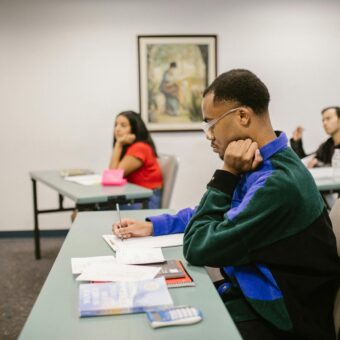
The ever-evolving landscape of markets and the intricate dynamics shaping various sectors have inevitably permeated the education sector, leaving it no choice but to adapt and transform. With the growing use of new technologies, particularly artificial intelligence (AI), unlimited possibilities for development and improvement have opened. However, when it comes to completing university assignments (Tang, 2024), it is evident that AI can have two different perspectives: the first as a support tool for improving syntax, through a grammar review process and the second as the actual producer of written work. This poses a problem for academic development and knowledge creation (Ouyang et al., 2022).
Therefore, the implementation of AI in higher education presents significant challenges. It should be established as a tool that can improve the quality of contributions by acting as a guide for content quality (Khan, 2023), generating interaction with students and the content production process, but not as the content producer itself (Crompton & Burke, 2023).
This is precisely why UNESCO’s report on “Artificial Intelligence and the Ethics of Teaching and Learning” emphasises the importance of increasing the academy’s focus on improving students’ ethical foundations as a way of reducing the ethical implications of AI in university assessments, especially as the continuous development of these technologies makes it increasingly difficult to verify the authorship content (Holmes & Miao, 2023).
This directly impacts student assessment, particularly in terms of equity and content authenticity. AI-based tools are now capable of not only developing technologies, codes and more but also producing content that is directly cited as requested (Li, 2023).

This capability has been improving over time as this tool is constantly being trained, and new options are emerging that focus on mimicking human thought. This raises concerns about maintaining the academic integrity, as there is a great effort underway to distinguish between what is real or not (Borger et al., 2020).
In contrast, while the development of new technologies provides new tools to constantly maintain and improve the competitive capacity of people, there is an immediate need from academics to address the challenge that it possesses, in the face of a future where people become so dependent on AI that their production is reduced, and thus the human response to challenges in their professional development is slowed down (Dwivedi et al, 20021).
This highlights the need for a turning point where the development of academic activities that teach the good use of AI is combined with raising awareness among students about the importance of using AI well. This should create realistic expectations that do not alienate students from technological evolution but do not make them entirely dependent on it (Chen et al., 2020).
According to Hota et al. (2023) implementing a structured process in which academia takes action to develop student’s skills and competencies to effectively manage artificial intelligence, increase their productivity, and generate responses to labour market challenges in different disciplines, always from an ethical perspective, where the student is the producer of ideas and artificial intelligence is supported as a tool that can empower development and promote continuous improvement of processes and procedures in different fields.
Consequently, there is an urgent need to maintain a holistic approach to technologies, where the focus can shift from reducing plagiarism or misuse of AI to promoting curiosity developing creativity and its responsible use to improve academic processes (Kelly et al., 2023) this forms the basis for the development of new competencies and skills that prepare students to take on major challenges in the workplace with the knowledge to harness the power of new technologies without becoming entirely dependent on them (Kimondo et al, 2023).
In conclusion, while AI can be a great tool for improving university assignments, we should not place all responsibility for completing them on AI. It is important to use AI ethically and responsibly, especially as AI tools become more sophisticated and capable of generating human-like results. Therefore, it is crucial to raise awareness about the ethics of using AI properly, as it can be a powerful tool for improving students’ academic abilities and enabling them to respond to the multidisciplinary challenges they face in the workplace. This highlights the need to promote AI as a tool for enhancing capabilities, not replacing them so that students can use it in their produced work without compromising their integrity. Thus, the ethical use of Artificial Intelligence in education promotes academic integrity and guides academic development towards deep and meaningful learning. By establishing itself as a powerful tool to benefit students in terms of the efficiency of their academic processes and equal access to knowledge, it is essential to maintain an up-to-date regulatory framework and a culture of academic honesty. This will allow us to access the advantages of artificial intelligence as a strategic tool for growth and personal and professional development.
References
Borger, J.G., Ng, A.P., Anderton, H., Ashdown, G.W., Auld, M., Blewitt, M.E., Brown, D.V., Call, M.J., Collins, P., Freytag, S. and Harrison, L.C., 2023. Artificial intelligence takes center stage: exploring the capabilities and implications of ChatGPT and other AI‐assisted technologies in scientific research and education. Immunology and cell biology, 101(10), pp.923-935.
Crompton, H. and Burke, D., 2023. Artificial intelligence in higher education: the state of the field. International Journal of Educational Technology in Higher Education, 20(1), p.22.
Chen, L., Chen, P. and Lin, Z., 2020. Artificial intelligence in education: A review. Ieee Access, 8, pp.75264-75278.
Dwivedi, Y.K., Hughes, L., Ismagilova, E., Aarts, G., Coombs, C., Crick, T., Duan, Y., Dwivedi, R., Edwards, J., Eirug, A. and Galanos, V., 2021. Artificial Intelligence (AI): Multidisciplinary perspectives on emerging challenges, opportunities, and agenda for research, practice and policy. International journal of information management, 57, p.101994.
Holmes, W. and Miao, F., 2023. Guidance for generative AI in education and research. UNESCO Publishing.
Hota, P.K., Bhatt, B. and Qureshi, I., 2023. Institutional work to navigate ethical dilemmas: Evidence from a social enterprise. Journal of Business Venturing, 38(1), p.106269.
Khan S. 2023., How AI could save (not destroy) education. Available from: https://www.ted.com/talks/sal_khan_how_ai_could_save_not_destroy_education?subtitle=en
Kimondo, C., Wandeto, L., Indimuli, D. and Ercertin, A., 2023. The impact of AI on teaching and learning. London Journal of Social Sciences, (6), pp.124-129.
Li, K., 2023. Determinants of college students’ actual use of AI-based systems: An extension of the technology acceptance model. Sustainability, 15(6), p.5221.
Ouyang, F., Zheng, L. and Jiao, P., 2022. Artificial intelligence in online higher education: A systematic review of empirical research from 2011 to 2020. Education and Information Technologies, 27(6), pp.7893-7925.
Tang Kuok Ho, D. (2024) ‘Implications of Artificial Intelligence for Teaching and Learning’, Acta Pedagogia Asiana, 3(21), pp. 65-79. DOI: 10.53623/apga.v3i2.404. Available at: https://www.researchgate.net/publication/378307304_Implications_of_Artificial_Intelligence_for_Teaching_and_Learning Accessed: [30 July 2024).
